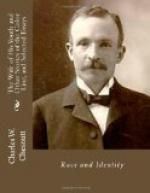Uncle Wellington’s Wives
I
Uncle Wellington Braboy was so deeply absorbed in thought as he walked slowly homeward from the weekly meeting of the Union League, that he let his pipe go out, a fact of which he remained oblivious until he had reached the little frame house in the suburbs of Patesville, where he lived with aunt Milly, his wife. On this particular occasion the club had been addressed by a visiting brother from the North, Professor Patterson, a tall, well-formed mulatto, who wore a perfectly fitting suit of broadcloth, a shiny silk hat, and linen of dazzling whiteness,—in short, a gentleman of such distinguished appearance that the doors and windows of the offices and stores on Front Street were filled with curious observers as he passed through that thoroughfare in the early part of the day. This polished stranger was a traveling organizer of Masonic lodges, but he also claimed to be a high officer in the Union League, and had been invited to lecture before the local chapter of that organization at Patesville.
The lecture had been largely attended, and uncle* Wellington Braboy had occupied a seat just in front of the platform. The subject of the lecture was “The Mental, Moral, Physical, Political, Social, and Financial Improvement of the Negro Race in America,” a theme much dwelt upon, with slight variations, by colored orators. For to this struggling people, then as now, the problem of their uncertain present and their doubtful future was the chief concern of life. The period was the hopeful one. The Federal Government retained some vestige of authority in the South, and the newly emancipated race cherished the delusion that under the Constitution, that enduring rock on which our liberties are founded, and under the equal laws it purported to guarantee, they would enter upon the era of freedom and opportunity which their Northern friends had inaugurated with such solemn sanctions. The speaker pictured in eloquent language the state of ideal equality and happiness enjoyed by colored people at the North: how they sent their children to school with the white children; how they sat by white people in the churches and theatres, ate with them in the public restaurants, and buried their dead in the same cemeteries. The professor waxed eloquent with the development of his theme, and, as a finishing touch to an alluring picture, assured the excited audience that the intermarriage of the races was common, and that he himself had espoused a white woman.




